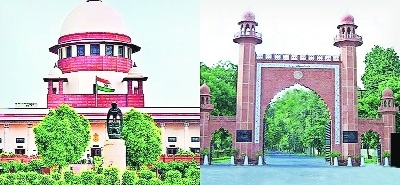Aligarh Muslim Unversity’s minority status will be decided by a new bench. 1967 judgement stated that the university cannot be considered a minority institution since it was created by a Central law
Date :09-Nov-2024

NEW DELHI,
(PTI)
THE contentious legal question over Aligarh Muslim Unversity’s minority status would be decided by a new bench, the Supreme Court held on Friday and overruled the 1967 judgement that said the university cannot be considered a minority institution since it was created by a Central law.
In a 4:3 majority verdict, a Constitution bench headed by Chief Justice D Y Chandrachud, said a legislation or an executive action that discriminated against religious or linguistic minorities in establishing or administering educational institutions, was ultra vires Article 30(1) of the Constitution.
Article 30 deals with the right of minorities to establish and administer educational institutions. Article 30 (1) says all minorities, whether based on religion or language, shall have the right to establish and administer educational institutions of their choice. “The view taken in Azeez Basha (1967 verdict) that an educational institution is not established by a minority if it derives its legal character through a statute, is overruled,” held the CJI, who authored the 118-page verdict, also on behalf of Justices Sanjiv Khanna, J B Pardiwala and Manoj Misra.
A five-judge Constitution bench in the S Azeez Basha v. Union of India in 1967 said AMU was a central university and couldn’t be considered a minority institution.
“Additionally, a linguistic or religious minority which has established an educational institution receives the
guarantee of greater autonomy in administration.
This is the ‘special rights’ reading of the provision,” the majority verdict said. Justice Chandrachud held that religious or linguistic minorities must prove that they established the educational institution for the community to be a minority educational institution for the purposes of Article 30(1).
“The right guaranteed by Article 30(1) is applicable to universities established before the commencement of the Constitution,” he said.
The CJI outlined the factors which must be used to determine if a minority has “established” an educational institution.
“The indicia of ideation, purpose and implementation must be satisfied. The idea for establishing an educational institution must have stemmed from a person or group belonging to the minority community and the educational institution must be established predominantly for the benefit of minority community,” he wrote. Implementation of the idea was stated to be another factor taken by the members of the minority community.
“The administrative-set up of the educational institution must elucidate and affirm (i) the minority character of the educational institution; and (ii) that it was established to protect and promote the interests of the minority community,” it said.
The question whether AMU was a minority educational institution must be decided based on the principles laid down in the judgment, it underscored. Judicial records of the case were,
therefore, directed to be placed before a regular bench, after receiving instructions from the CJI on the
administrative side, for deciding the minority issue and adjudicating appeals against a 2006 verdict of the Allahabad High Court, which struck down a provision of the 1981 law according minority
status to AMU.
Comprehensive win for minority rights, says AMU fraternity: The Aligarh Muslim University fraternity on Friday welcomed the Supreme Court’s ruling on the institute’s minority status, saying it reaffirms the foundation principles on which the varsity was established.
Prof Faizan Mustafa, a constitutional law expert and former registrar of AMU who had filed this case in the Supreme Court in his ex-officio position, told PTI, “It is a comprehensive win for minority rights in general and AMU in particular.”
Reacting to the Supreme Court’s verdict, former Vice-Chancellor of AMU, Lt Gen (Retd) Zameeruddin Shah told PTI, “By overturning the earlier judgement in the Azeez Basha case, the Supreme Court has responded to the aspirations and hopes of a large segment of India’s population.”
He also asserted, “This judgement should serve as a lesson for us and should also ensure that the AMU should not just remain a beacon light for us but should also pave the path for lighting many more beacons of hope for the entire country.”
Earlier in the day, the Supreme Court deferred the question of AMU’s minority status to a new bench and overruled the 1967 judgement that said the university cannot be considered a minority institution since it was created by a central law.
Rahat Abrar, historian and former director of AMU’s Urdu Academy who played a prominent role in providing vital historical documents to legal experts in the case, said the judgement has validated the claims of the AMU community which had always maintained that the case should be decided based on historical evidence on the identity of those organizations and individuals who had envisaged the idea behind this institution and worked for its establishment.
Secretary of the AMU Teachers Association (AMUTA) Mohammad Obaid Siddiqui said the judgement reaffirms the idea behind the establishment of the institution for fulfilling educational aspirations, while also maintaining its commitment to an inclusive environment serving all sections of society.
Prof Aftab Alam, chairman in the Department of Strategic and Security Studies at AMU and a noted scholar in the field of international human rights law, told PTI, “It is a historic judgement, which has overruled the earlier 1967’s judgement which had denied minority status to AMU.”



